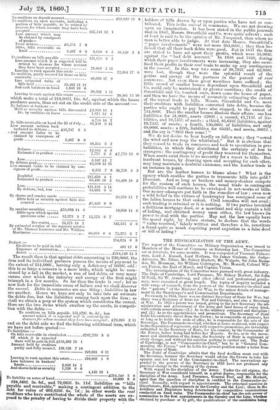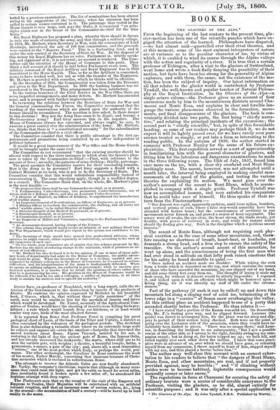THE REORGANIZATION OF THE ARMY.
TUE report of the Committee on Military Organization was issued to Members of the House of Commons on Saturday last. The Committee sat at intervals, for some months. It was composed of Viscount Palmer- ston, Lord J. Russell, Lord Hotham, Sir James Graham, the Judge- Advocate, Mr. Ellice, Mr. Sidney Herbert, Mr. Walpole, Sir John Rams- den, Mr. Horsman, Sir William Codrington, Mr. Monsen, Colonel Wil- son Patten, the Earl of March, and Captain Vivian.
The investigations of the Committee were pursued with great industry. The Duke of Cambridge, Lord Panmure, Mr. Sidney Herbert, Sir John M'Neill, Sir W. Armstrong, and other official and professional gentle- men, were examined at great length. The topics of inquiry included a wide range of research, from the powers of the Commander-in-chief and the " patents" of the Minister for War to the minor details of manage- ment in the Storekeeper's and Commissariat Departments.
Previously to 1854, there was no distinct Secretary of State for War, but there was a Secretary of State far War and Colonies, and also a Secretary at War. In 1855 a patent was issued, giving to the new Secretary the ad- ministration and government of the Army and land forces of every kind, with certain reservations-(1.) As to the military command and discipline ; and (2.) As to the appointments and promotions. The Secretary of State holds his authority direct from the Crown ; he is removable at pleasure, but so long as he holds the seals of office, he is responsible for the acts of the Sovereign. The Commands-in-chief, whether at home or abroad, with respect to the disposition of regiments, and with respect to promotions, arc invariably submitted to the Secretary a State, for his consent, by the Commander of the Forces, before being laid before her Majesty. So too, as to the move- ment and distribution of the Army, the Secretary of State is cognizant of every change, and without his sanction nothing is carried oat. fhe Duke of Cambridge, is not "Commander-in-Chief," but he is "General Com- manding the Forces," and he holds his present position under a letter from the Secretary of State. The Duke of Cambridge admits that the final decision must rest with the Secretary, because the Secretary would advise the Crown to take his opinion and not that of the Commander-in-chief. The reservations ap- pended to the powers of the Secretary in 1855 have not produced any practical change in the working of the system. With regard to the discipline of the Army. Under the old regime, the Secretary at War considered himself; in a great degree, responsible for the discipline of the Army. Lord Panmure, General Peel, and Mr. Herbert, agree that the question of discipline is confided to the Commander-m- chief Secondly, with regard to appointments. The principalquestion in thisrelatesto, first, appointments in the Cavalry and the Line ; those in the Artillery and Engineers being determined by competitive examinations conducted on fixed rules. The Commander-in-chief has the sole power of nomination to the first appointments in the Cavalry and the Line, whether obtained by purchase or by gift, the qualifications of the candidates being tested by a previous examination. The list of nominations has been altered owing to the suggestions of the Secretary, when his attention has been called to certain names contained in it. The patronage thus vested in the Horse Guards is very large, and, says the Duke, it is exercised "on prin- ciples which rest in the breast of the Commander-in-chief for the time
being."
His Royal Highness has proposed a plan, whereby there should in future be only one mode of entering the army, and that through a military college. In 1854, Mr. Herbert, when Secretary at War, with the concurrence of Lord Mardinge, introduced the sale of 100 first commissions, and the proceeds were carried to the "Reserve Fund." This is a fluctuating fund, and is under the sole control of the Secretary of State for War. In the disposal of this money his Royal Highness has no voice. Parliament is, strictly speak- ing, not cognizant of it ; it is not voted; no account is rendered. The Com- mittee call the attention of the House of Commons to this point. They think a full account of it should be laid before Parliament every year. The military command of the Royal Artillery and Royal Engineers was in 1855 transferred to the Horse Guards. This, as far as the Artillery is concerned, seems to have worked well, but not so with the transfer of the Engineers. Mr. Herbert is provided with remedies,. which he thinks will be effective.
In the December of 1854, the Commissariat was taken from the Treasury and given to the War Department. In 1856 the banking business was re- transferred to the Treasury. This arrangement has been satisfactory. In the various branches of the Civil Service in the War Office there are many imperfect arrangements, and many defects. Mr. Herbert has amended some, and is prepared with further improvements.
In reviewing the relations between the Secretary of State for War and the General commanding the Forces, the Committee recommend that the wording of the reservations which are placed upon the authority of the former should be reconsidered. The question is here asked, Is there danger in this doctrine ? May not the Army thus cease to be Royal, and become a Parliamentary Army ? Earl Grey answers this in the negative. The House of Commons always has exercised, and always ought, he says, to exercise a great control over the administration of the Army. Mr. Herbert, too, thinks that there is " a constitutional necessity" for the subordination of the Commander-in-chief to a civil officer.
The Committee consider that there is public advantage in the first ap- pointments and promotions being conducted by an officer independent of political influence.
It would be a great improvement if the War Office and the Horse Guards could be brought under the same roof.
The Committee do not recommend "that the existing practice should be altered with respect to the three instances in which alone the Queen's plea- sure is taken by the Commander-in-Chief:—First, with reference to the amount of force ; secondly, the patterns of army clothing ; thirdly, patronage. The great question the Committee reserve for their concluding remarks, How is the Army to be governed ? Earl Grey suggests a Board with a Cabinet Minister at its head, who is not to be the Secretary of State. The Committee consider that this would redistribute responsibility instead of concentrating it. The same objections apply, though in a modified degree, to a cbuncil. The Committee think that, on the whole, Mr. Herbert's plan is the most feasible :-
" He proposes that there shall be one Commander-in-chief, as at present.
"A Parliamentary Under-Secretary, two permanent Under-Secretaries, one of whom shall be a Military officer, and also an Assistant Under-Secretary. "A Director of Materiel, an Officer of Artillery, to superintend the manufacture of all warlike stores.
" An Inspector-General of Fortifications, an Officer of Engineers, as at present. " A Military Officer to overlook the commissariat, the clothing, and all stores not called ' warlike stores,' to be Called Director of Supplies.
"A Director-General of the Medical Department, as at present.
"A Storekeeper-General, as at present. " A Commissary-in-chief, as at present. " An Inspector of Militia and Volunteers, reporting to the Parliamentary Under- Secretary. "An Accountant-General, having charge of the Finance. The scheme thus proposed would secure an infusion of new military blood into the War Department, which would give vigour tq the system and confidence to the Army. " The Secretary of State would have around him professional advisers, whose opinions he might consult, either separately or collectively, according to his view of the exigencies of each case. " On the whole, your Committee are of opinion that this scheme proposed by Mr, Herbert has the merit of reducing change to the minimum; while it promises an in- crease of real efficiency. " Mr. Herbert has also declared it to be his opinion, if one or more of these mili- tary heads of departments bad seats in the House of Commons, the public advan- tage would be great. When the Secretary of State is a civilian, unaided and un- supported by military colleagues in the House of Commons, he is exposed to serious difficulties, and his administration of the Army is inadequately defended. When he speaks on military subjects, his authority is questioned; when he answers pro- fessional questions, it is known that he retails the opinions of others rather than that he is pronouncing his own. His position in the House of Commons would be far different if he harelip his side a colleague, a soldier of distinction, at all times ready to sustain his answers and to uphold his authority."
Doctor Sam' ex-professor of Neuchatel, with a long report, calls the at- tention of the Government to the destruction by insects of the products of Alsatia. He confirms the opinion expressed by,Michelet in his beautiful book, L'Oiseau, which is, that without these "Jolla musiciens" of the earth, man would be unable to live for the myriads of insects and larva, which would be developed. Dr. Turrel, secretary of the Agricultural Com- mittee of Toulon, would have the shooting of insectivorous Uling birds pro- hibited ; a rule which would banish from our kitchens, or at least would render very rare, birds of the most admired flavour.
It is reported from Rome that Professor Ponzi is compiling his great geological chart of Lazio, of the basin of the Tiber and Umbria, a district so often convulsed by the volcanoes of the geological periods. The Architect Rosa is also delineating a valuable chart where on an extremely large scale he collects and exposes all—even the smallest—footpaths that surround the sacred territory about Rome. Signor Visconti, assisted by his son, is restoring to the light of day the ancient gate of Rome, the famous Ostia, and has already uncovered the dockyards ; the marts, where still are to be seen the earthen pots, with weights ; a theatre, a beautiful temple, baths, a gymnasium, a square, a gate of the city; and, above all, a most interesting "mitreo," one of the most perfect which Italy, or perhaps the world, pos- sesses. The other archiologist, the Cavaliere de Rossi continues the work of his master, Father Marchi, concerning that immense treasure of Chris- tian memories which is enclosed in subterranean Rome.
The attempts to recover the Atlantic Cable are now finally abandoned. Mr. Farley, the company's electrician, reports that although on many occa- sions they could raise the light, and got the cable on board for seven miles, they invariably found it broken again a few miles off; he abandoned the hopeless attempt with deep regret.
The roulonnais says that on the occasion of the visit of the Emperor and Empress to Toulon,, their Majesties will be entertained with an artificial volcanic eruption, and -that an immense mass of useless rockets, &c., lying in the arsenal—the accumulation of half a century—will be burnt up to lend reality to the scene.



























 Previous page
Previous page